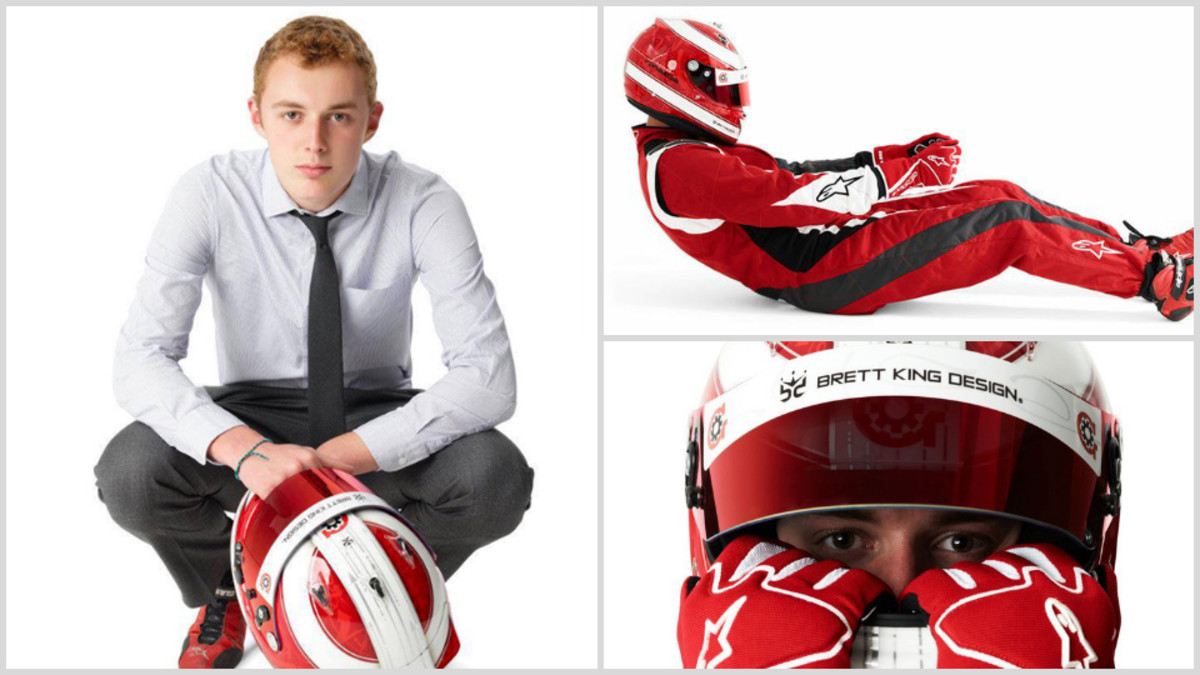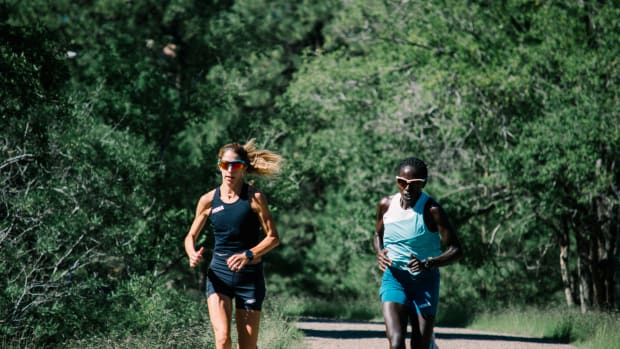Teen Racer: 18-Year-Old Luca Forgeois Turns Trouble into Speed
Life handed him lemons; Luca Forgeois made citron pressé. He was diagnosed with ADHD and dyslexia as an adolescent, and dismissed as a dreamer for aspiring to become a racecar driver. And yet here he is, not only a series champion in open wheel’s minor leagues and an entrepreneur at 18 years old, but a garrulous intellectual who delivers his sharp opinions with a Franco-American worldliness that belies his cherubic face of red hair and braces—an ideal face for CHADD, a national ADHD education and advocacy nonprofit. During a recent visit to the SI offices, Forgeois held forth on his journey to this point, what it will take to achieve his goal of racing in IndyCar (hint: $$$), and the rivals who stand in his way.
On his racing start
“Life was pretty miserable. I was 12 years old. I had dyslexia, ADHD and was struggling in school. I was a legitimate misfit. Most kids, their parents were excited to pick them up from school, to ask, ‘What did you do today?’ I was put in a corner during classes because I just could not pay attention. I could not sit still. I was depressed. I didn't see the point of existing.
“One day, my dad said, ‘Let’s try something different.’ So we drove two hours from our home on Manhattan’s Upper East Side to a go-kart track upstate called Oakland Valley Race Park. I must’ve maxed out at 25 miles an hour, but to me that felt so fast. I also never felt so comfortable, so relaxed or so clear in my mind. That hooked me.”
On his career climb
“I was late to the show. I did two years of go-karting (not enough time to mature) then jumped in a car, an F2000 with four on the floor. I had never shifted anything in my life—not even a Honda Civic! I was quick out of the box—raw ability, I guess—but I destroyed the gearbox because I did not use the clutch. (It was so much to do!) Still, I did well enough on that test run to get signed by Pabst Racing Services to race in the National Class of the USF2000 series, a single-A minor league for open-wheel racing. I won the championship in my first year.
“That was kind of the high point in my life because I was so young and I had so little experience. The next year, though, was a struggle. I probably spent a quarter of the time on the track that my competitors did because I had so many mechanical issues. That’s when I learned just how much money rules the sport.”

While growing up, Forgeois had trouble focusing on things like schoolwork for more than 10 minutes at a time. However, Forgeois would soon realize that racing could be his mental sanctuary.
Luca Forgeois
On the encouragement he got off the track
When I’d leave to race in Indianapolis or Milwaukee, my high school teachers would ask, ‘Where were you?’ I was racing cars, I’d say. People would ask me, ‘What do you want to do with your life?’ I want to race cars, I’d say. They’d look at me like, Aww, that's cute. That's a hobby. One day you’re going to grow up and you’re going to become a lawyer or doctor or something. It’s silly until you’re in IndyCar, until you’re in Formula One. Then people say, ‘Oh, this is a job. This is real.’”
On growing up with ADHD
“I wasn't intentionally setting out to make my parents the most well-known parents at my school. I would come in and say, I'm going to sit in this seat and focus. That lasted 30 seconds before my mind was on fire, before I just had to walk around. For the longest time I would do homework in 10-minute increments, then run a lap around the house, and then come back for another 10 minutes. That’s when my mom was like, ‘Let’s get you diagnosed.’
“After my ADHD was discovered I went through a lot of different meds; the one that worked was Focalin. I’m a big believer in how necessary it is to get through school, which is very one-size-fits-all. You need medication to fit the mold. Medication helped me calm down and hyper-focus. But after school, you should just stop because your imagination will be an upper hand on everybody you work with in whatever profession. It’s a strength.”
On racing with it
“I think my ADHD helps me because my mind is always racing. But when I’m actually driving, I can only focus on one thing. I don't have the option of thinking of seven different things [everything] is happening so quickly it requires so much of my energy, of my mind. It’s my natural habitat.”
"I want to bring racing back to the time when it was about hardship, about struggle. It’s a gladiator sport." — Luca Forgeois
On fighting through dyslexia
“I was illiterate until I was 12. My friends would tell me, ‘I just learned a word today. What are you at?’ And I’d be like, ‘I'm still figuring out how to spell the.’
“Finally, I just told myself one day, ‘If someone’s going to fix this, it's me.’ This was after I got introduced to racing. I just felt that no matter how fast I drove, no one would pay attention if I can’t talk to or even email people. So I asked my mom to bring me to Barnes & Noble, and I picked out the biggest book I could find, in the fiction section—a 544 pager called Eragon. I tell people I was reading a page and hour, but that’s better than my actual pace—which was closer to a paragraph an hour. It was just struggle. But I told myself I'd get through.
“I ended up that year finishing the book and increasing my pace to 10 pages an hour. It’s not a big deal, but for me it was like a massive accomplishment. And that just brought my confidence up to the point where I said, ‘I might be at a disadvantage, but work ethic is a quality. And if I have it I can get through anything I choose to take on.’”
On the physical demands of racing
“An IndyCar driver will deal with five to six times the force of gravity in a corner. So now imagine if you don’t flex your stomach, if you don’t tense up as you go through a corner—sometimes 17 of them in one lap, the majority of a lap. If you don’t flex, if you don’t tense up, your lungs will get crushed. Your head all of a sudden weighs five to six times what it normally weighs. And on top of that you have a helmet on. And also you’re braking, you’re accelerating. Surviving that is like doing a gentle jog for two hours while at the same time tensing up your muscles. Your muscles don’t evolve in a second’s notice. You have to build them up.”
On his workout and diet approach
“I don’t care about just being in shape. I like pushing myself to the limit, like the Navy SEALS—a culture I’m a big, big fan of. I like to run on the treadmill to the point where my lungs are on fire, and I feel like I’m going to pass out or throw up. I’ll go to the pool and I’ll look up a formidable drill online and do that.
“I go rock climbing. It helps me lose weight and add muscle. It’s also a phenomenal puzzle. You start at the bottom, you get to the top, and although your muscles are burning, you have to think on the go.
“I lift weights. I bulk up in the offseason; at my heaviest (200 pounds), I was benching five sets of 225 pounds. And then when it’s time to race, it’s like, ‘Ok, we’ve had our fun,’ and I go back down to 175. But then I’m doing 20 reps of 135. For me, it’s about building the endurance of my muscles, because a race is two hours long. That’s such a thrill, to redefine your limits. Except when it comes to my diet. I truly hate not eating what I like because I eat so much junk food. I love dairy so much. I once ate four pints of Ben and Jerry's, at 4,400 calories, in one hour!”

According to Forgeois, he believes his condition is actually an advantage on the racetrack. “I think my ADHD helps me because my mind is always racing. But when I’m actually driving, I can only focus on one thing."
Luca Forgeois
On the financial demands
“I just hate this aspect of the sport so much. I’d rather do this all on my own. So I went to work in a coffee shop in Union Square. I partnered with Janine Just Inc., a marketing firm that is very creative about pairing me with sponsors beyond the traditional racing brands (like EFactor and HIT e-Cigs). And I started a RocketHub campaign to crowdfund my dream.
“When I succeed, I want it to be because I earned it. I want to bring racing back to the time when it was about hardship, about struggle. It’s a gladiator sport. All it needs is gladiators instead of rich kids playing with wooden swords.”
On the entitlement complex in racing
“There are still remnants of the drivers in IndyCar, for example, that made it on talent. And then there are drivers like Marco Andretti and Graham Rahal, whose fathers basically gave them a ride.
“I read an article not too long ago in which Graham Rahal said, ‘I think me and Marco are the future of this sport. Why? Because look at our legacy. If I were IndyCar, I would really push us forward on the billboard. I think we should be winning races.’ It was almost as if he were saying, I think IndyCar should let us win races. What the hell is that? You haven’t done anything. You haven’t earned that. Being a champion, you have to earn it. You have to fight for it!”
On death
“The risk is what makes racing so much more interesting compared to everything else. Why am I going to live? I’d love to live until I’m very old. But I don't want live until 90 or 100 just being so timid about everything. When I’m racing and hitting big speeds like 160, 180 miles an hour, you’re so close to death. You’re brushing it. You have to respect it. But in that moment, I’ve felt like I've lived more than people who are in their 40s and 50s and have not done anything they love in life.”





